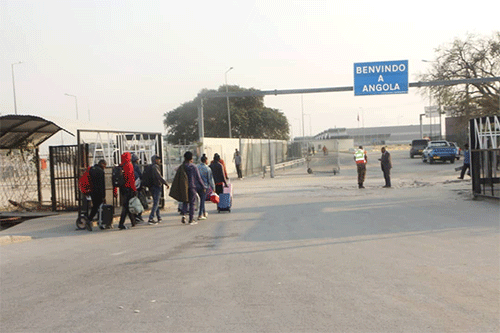Maria David
OSHIKANGO – Oshikango, located on the Namibia-Angola border and now part of the town of Helao Nafidi, was desolate when Namibia gained its independence in March 1990.
There were two or three shebeens, several abandoned buildings riddled with bullet holes, a water tower which also served as a military outpost of the SANDF/SWATF, and a few scattered traditional homesteads in the surrounding area.
But today, Oshikango is one of the biggest business hubs in the northern regions, having attracted local and foreign investors.
It is home to an Economic Processing Zone (EPZ) and several foreign-owned companies, contributing significantly to the local economy.
However, amidst this impressive growth story, Oshikango has become a breeding ground for traders dealing with illicit goods illegally imported from Angola. This includes the pervasive issue of fuel smuggling along the Namibia-Angola border, called ‘Ngungula’, which is severely impacting local filling stations, causing them to lose customers at an alarming rate.
The consequences of this illicit trade have been dire, with two service stations forced out of business in recent years.
One of them closed years ago, while the other in Omafo shut its doors recently.
The closure of these service stations has had a profound effect on the community and the local economy.
Nampa spoke to various individuals affected by these closures, who pointed to the ongoing fuel smuggling problem in Helao Nafidi as the root cause.
Many vehicles pass the local service stations, instead opting to queue up in Angola for fuel.
When this news agency visited the town last month, police vehicles were visible on the ground, conducting routine operations. A group of men lined up on the other side of the border, waiting for the situation to calm down. As the second patrol concluded, they hurriedly approached vehicles waiting for refuelling, each seller fending for themselves in their attempt to find a buyer.
Fuel sellers lamented the challenges they face during police operations, particularly during peak hours.
“We have to wait for the situation to calm down because if we are caught, we either face prosecution, or our containers [with fuel] are confiscated,” one said.
He sells petrol for N$60 per five litres or N$350 per 25 litres, while diesel costs N$250 for 25 litres. However, the prices fluctuate, depending on economic conditions in Angola.
Helao Nafidi mayor Darius Shaalukeni expressed concern about the impact of the closure of service stations, noting that the situation is disheartening for visitors and detrimental to the town’s revenue- generation.
He, however, also pointed out that by law, council does not have the authority to address fuel smuggling activities directly, relying solely on the police and other stakeholders for enforcement.
“With the absence of a mandate, there is limited action we can take as a council, despite the unsatisfactory situation on the ground,” said Shaalukeni.
Minister of Mines and Energy Tom Alweendo recently acknowledged the challenges posed by the extensive Namibia-Angola border, making it difficult to combat illegal fuel smuggling effectively.
He stressed that a key solution lies in bridging the price differential between fuel in Namibia and Angola.
Alweendo observed that while fuel in Angola is not necessarily cheaper, the Angolan government subsidises the difference between the purchase price and the selling price.
“As long as that remains in place, it will be a problem for Namibia,” he said.
The minister emphasised that the continuation of this trend could have severe economic implications because when people engage in illegal fuel importation, they divert revenue away from crucial road maintenance funds, impacting infrastructural development and the overall well-being of the country.
– Nampa


